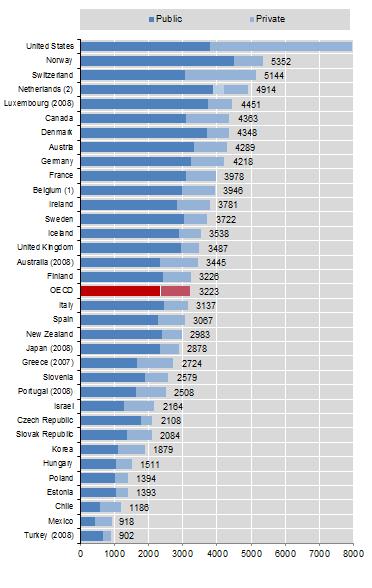The United States needs universal state-sponsored health care. Here's why: Right now, the people who do pay for state-sponsored health care (workers) do not receive it, and the people who receive state-sponsored health care (children in lower income families, unemployed parents, people too disabled to work, and seniors) do not pay for it. This disparity means that whenever state-sponsored health care is discussed, the two sides can never see eye to eye: The people who are not receiving benefits want to cut their costs, and the people who are not paying for their health care want more benefits or at least do not want their benefits cut. In recent years, this means that the federal government and some state governments have gone into severe debt trying to satisfy both parties—using money that does not exist to keep and even expand benefits while cutting the taxes that partially pay for these programs. While I am specifically discussing health care in this post, this same dichotomy is true for many government taxes and programs: the payers receive few benefits, and the beneficiaries do not pay.
Not all residents of developed countries feel the same way about taxes as residents of the United States. An April poll showed 64% of Canadians would be willing to pay slightly higher taxes in order to preserve benefits. Why do they want to pay for benefits? Every Canadian who buys anything pays a value-added tax that funds government programs, which means all Canadians both pay for and receive benefits like universal state-sponsored health care, which is administered by the provinces. No wonder they feel more positive about taxes! (Scandinavian countries have even more aggressive and more effective high-tax, high-benefit, high–budget surplus systems, which are probably too foreign for the United States to even attempt to emulate.) A fairer system would have everyone pay and everyone receive benefits.
Moreover, requiring employers to provide health insurance to their employees puts an undue burden on employers. They hire fewer workers and are more likely to move their company to a country that has another health care arrangement. A recent report shows that employers are shifting more and more of the health care cost burden onto employees.
 |
| Health expenditure per capita in US$ Purchasing Power Parity (PPP) 2009, OECD countries |
Our current health care system is also grossly overpriced, which a universal state-sponsored health care program would surely address. In 2009, health care spending made up 17.4% of the entire GDP in the United States, compared to 9.8% of the the GDP of the United Kingdom, which has universal state-sponsored health care. A common rebuttal to this argument is that, while expensive, health care in the United States is better than health care in countries with universal state-sponsored health care, or even "the world's greatest [health] care system." Well, it's not. Here's another report on the dismally expensive state of United States health care.
A lot of medical innovation comes out of the United States because the United States is a populous, developed country, not necessarily because the United States is actually better at encouraging medical innovation. A 2011 report found not only that "the medical technology innovation ecosystem . . . is moving offshore," but also that "US consumers aren’t always the first to benefit from medical technology and could eventually be last." Because government regulation has made medical treatment cheaper in other countries, more people can access it, ultimately creating more revenue for pharmaceutical companies and other private medical innovators.
Finally, because health insurance companies and hospital chains are allowed to profit and be publicly traded in the United States, profit is what the for-profit health insurance companies and hospital chains seek to satisfy their investors. They must pay out less in health care and administration than they collect in premiums and fees. That's how profit works. Any capitalist system benefits the strong and powerful over the weak and helpless; therefore, every system in the United States does not and is not expected to follow the capitalist model. For example, our country holds the value that all children should have a certain level of education, not just the children who can most efficiently achieve that level of education. Rightly or wrongly, we spend a lot of time, money, and effort on the children who offer the lowest return on our investment. If we can socialize education, why not health care? Health care should be a public service that pays for itself, no more, no less.
To conclude, the unholy union of public and private health care programs in the United States is unfair, overpriced, hurting patients, and violating American ideals of equity and compassion.
Terms
- state—the operations or concerns of the government of a country.
- state-sponsored health care—a program in which health services are paid for by a government body using government funds collected from taxes or other sources of revenue. In the United States, Medicare, Medicaid, and CHIP are forms of state-sponsored health care. Contrary to popular email rumor, the Affordable Care Act, often called Obamacare, is not universal state-sponsored health care, though it does give states the option of adding more people to their Medicare plans.
- universal state-sponsored health care—state-sponsored health care that is extended to all residents.

